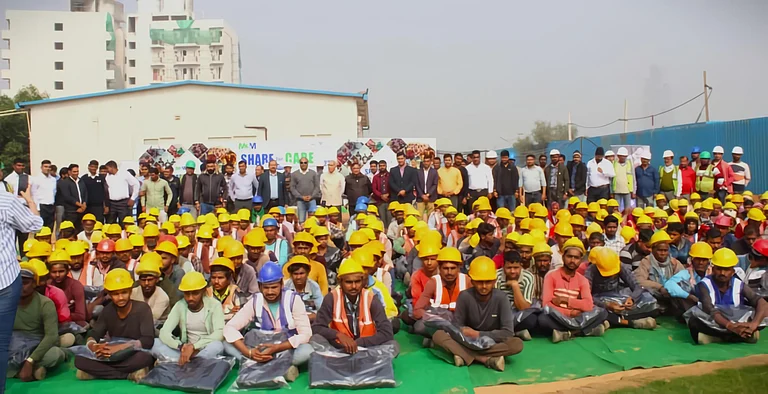
This year, more Bihar migrant workers are determined to return home and cast their votes.
Kerala is a workplace for an estimated three to five lakh migrant workers from Bihar.
Parties like the RJD and BJP quietly campaigned in Kerala among the workers.
For weeks, Bipen Kumar hesitated to return to Bihar to vote. He had been there just four months ago, and the long trip home meant losing a few days’ wages. On Sunday, he finally boarded a train north.
“I’m not actively interested in politics,” he said before leaving. “Back home, we used to vote for Nitish Kumar. But this time, I might vote for a change.”
Bipen works at a salon in Kakkanad, Kochi—a part of Kerala’s large migrant workforce that includes many from Bihar. These workers are vital to Kerala’s economy, from construction to restaurants and homes.
Every year, thousands of Biharis leave their villages for states like Kerala, where even low-end jobs offer better wages and security.
Migrant workers- straddling two geographies
As Bihar votes again, workers like Bipen navigate life between two worlds—their workplace in Kerala, and their roots and political identity tied to Bihar, underscoring how migration intertwines with voting rights.
No study has precisely counted the number of migrants from Bihar living in Kerala, but estimates suggest the figure could range from three to five lakh. Most of them work in the footwear, iron and steel, and construction sectors. A sizable number are employed at the Cochin Shipyard, mainly in welding and related work.
“But some migrants from Bihar prefer to work in agricultural fields — especially on estates in hilly regions like Idukki,” says Fr. Immanuel, who runs Jeevika, an organisation working for the rights of migrant labourers. “But they don’t earn as much as their counterparts in other sectors. The wages are low, and the work is seasonal and physically demanding.”
Yet, for many employers in Kerala’s high ranges, these workers have become indispensable. As local youth increasingly turn away from farm labour and plantation jobs, migrant workers from Bihar and neighbouring states have stepped in to fill the gap — quietly sustaining the state’s once-declining agricultural sector.
Rasheed came to Kerala six years ago. He has never gone back to Bihar during an election. But this time, he asked his restaurant owner for leave in November. “I have to make sure my name is on the voters’ list. And if I don’t vote this time, I’m afraid I might be permanently struck off,” he said — his voice carrying the anxiety over the Special Intensive Revision (SIR) of electoral rolls and the threat of being omitted from the list.
This anxiety highlights how migrant workers navigate the pursuit of better livelihoods in Kerala while maintaining their political identity in Bihar—a tension that defines their experience as citizens.
Binoy Peter, Executive Director of the Centre for Migration and Inclusive Development (CMID), corroborates this trend. “When it comes to elections, migrant workers usually take more interest in local body polls — perhaps because they are familiar with the candidates,” he said. “But this time, many seem eager to return home, possibly due to the controversy surrounding the Special Intensive Revision (SIR) of electoral rolls.”
But there are people like Akash Kumar, whose father migrated to Kerala from Sheikhpura district in Bihar in the early 1990s. He brought his family along, and his children, Akash and Payal, grew up and studied here. Today, Akash works as a financial manager after completing his degree, while Payal secured the first rank in her undergraduate exams from Mahatma Gandhi University.
For them, Kerala is home — the only place they truly know. Yet, stories like theirs remain rare. For the vast majority of migrant workers from Bihar and Kerala, the destination is a place to earn, not a place to belong. Every year, lakhs of them return to their hometowns when it’s time to settle down, their ties to home remaining stronger than the roots they’ve tried to grow in this southern state.
Vote in Bihar, Campaign in Kerala
Apart from this, political parties have also begun to quietly view Kerala’s migrant population as a potential political constituency — especially in the context of the Bihar elections. Both the Rashtriya Janata Dal (RJD) and the Bharatiya Janata Party (BJP) have made discreet efforts to reach out to migrant workers from Bihar who are living and working in Kerala.
Dr Vargheese George of the RJD said the party had planned its outreach well in advance and had met several groups of migrant workers. “We carried out our work mainly in Kovalam and in some parts of the Ernakulam district. Though many of them have traditionally voted for Nitish Kumar, this time there is a visible sense of anxiety among the minority community — especially after the SIR controversy and the rising Islamophobia,” he said.
According to George, the RJD’s campaign focused on teaching workers about voting and ensuring their names were on the rolls. “Once we began, the BJP also started similar outreach,” he added.
He believes that the Congress and the CPI(M) missed an opportunity to engage with this large and politically conscious group. “Had the Congress and CPI(M) also joined hands, the INDIA bloc could have motivated many more to return home and vote — even helping with their travel arrangements,” George said, blaming the two parties for failing to look at politics beyond Kerala’s borders.
Economic Cost of Vote
Politics apart, what will it cost the migrants to take leave and travel home to vote? According to some estimates, around 7 per cent of Bihar’s population has migrated to different parts of India and abroad in search of employment.
The Centre for Migration and Inclusive Development attempted to put a price tag on this civic exercise. Taking a conservative estimate of 40 lakh migrant workers taking 15 days off to travel home, CMID calculated that the total economic cost could touch Rs 2,600 crore. The figure is based on an assumed average daily wage of Rs 400 and a travel expense of Rs 600 per person.
However, citizenship and voting rights cannot be measured in financial terms. As workers like Bipen and Rasheed board trains home to vote, they carry with them more than just their earnings. They take back experiences from a state that offers them better wages.
Their journey is a reminder that India’s economic and political narratives are inseparable — that the votes cast in Bihar resonate across the workplaces, shipyards, and construction sites of distant Kerala.



























